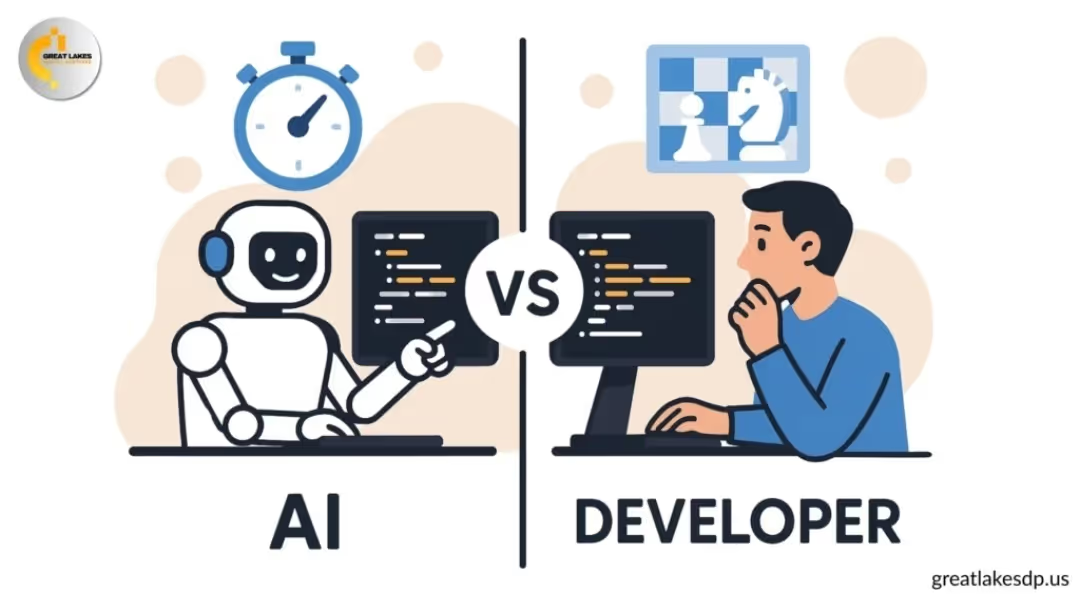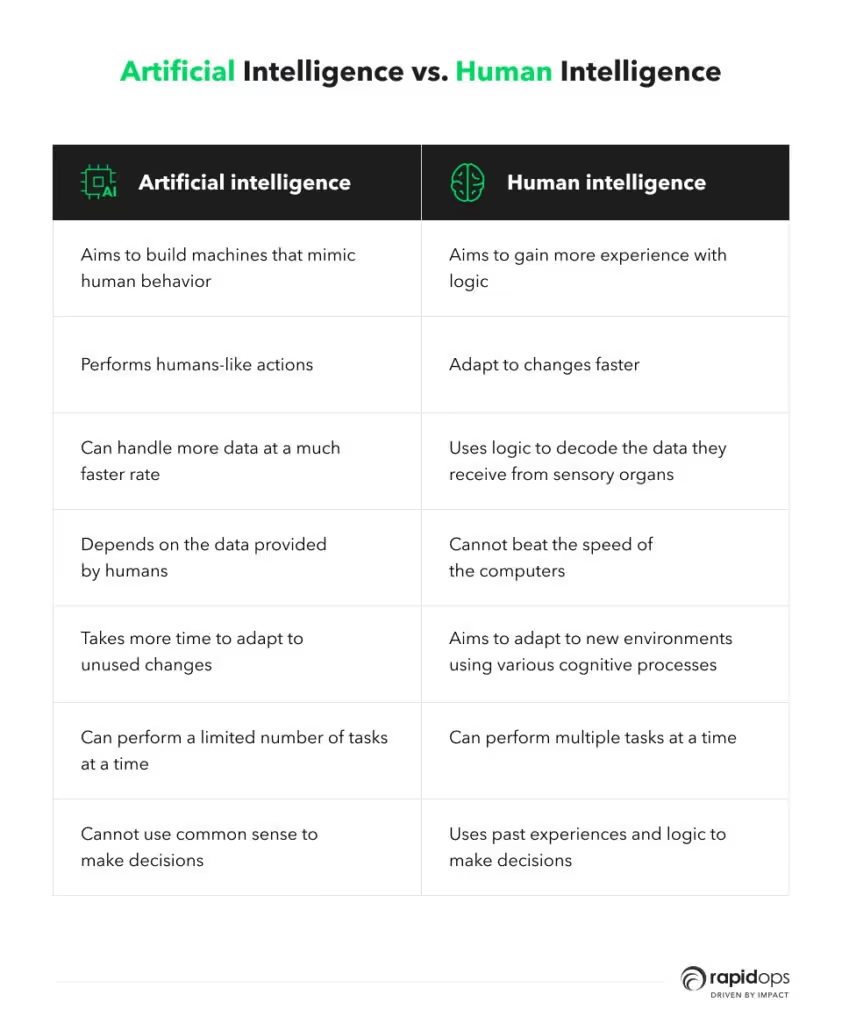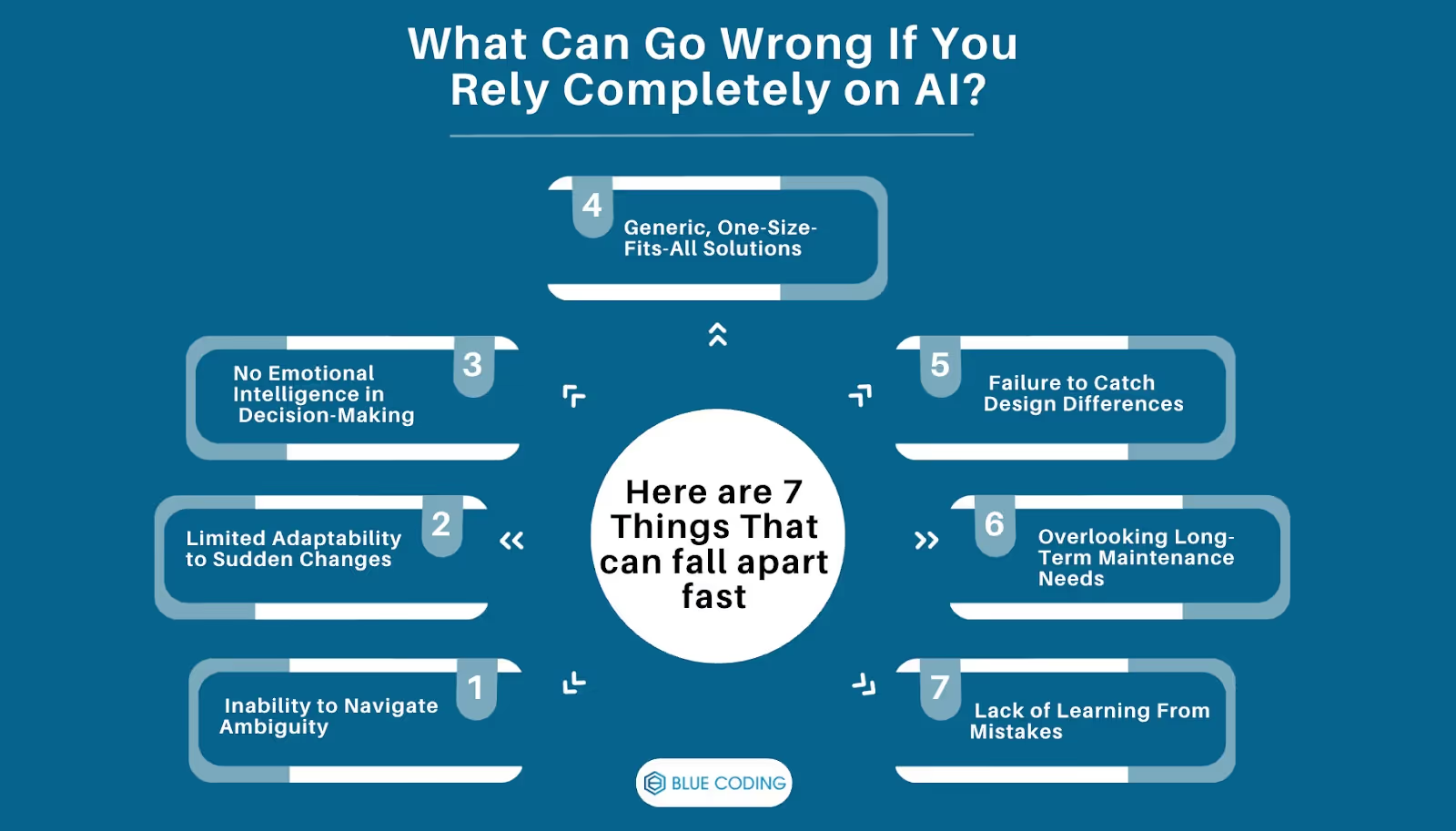Recent developments in AI may have led you to believe that AI can do anything and everything! But remember, there's always a catch. While AI tools are evolving fast, generating code, automating tasks, and even mimicking human decision-making, there’s still a limit to how far they can go without human oversight. Especially in software development, where context, creativity, and collaboration matter, remote developers remain the backbone of real, usable innovation. So before you think of replacing your dev team with the latest AI model, let’s talk about why you still need them more than ever and what are some remote developers use benefits.

AI might be able to write code, but it doesn’t understand the why behind it. Your remote developers are not just typing out lines of syntax. They’re solving real problems for real people. They listen to business needs, interpret user pain points, and make decisions based on context that AI simply can’t grasp. Let’s face it. AI doesn’t know your target market, your startup’s vision, or that tricky little bug that only happens during an edge case no one predicted. Human developers know how to ask the right questions, fill in gaps in unclear requirements, and work through challenges that don’t follow a script. They code and think critically, leading to constantly adapting, and making sense of the messy, ever-changing real world.
Writing code is only part of the job. Remote developers know how to work with teams, respond to feedback, and communicate across departments. That human element like Slack messages, Zoom calls, sprint planning, even reading between the lines of vague client feedback doesn’t exist for AI. Your remote team knows when to push back, when to ask questions, and how to keep a project moving even when things aren’t crystal clear. Software development is a team sport. While AI can hand you suggestions, it can’t sit in your meetings or manage expectations with a client. Remote developers bring emotional intelligence, diplomacy, and common sense into every interaction. Something you can’t automate with a tool.
AI works from patterns, training data, and predictive logic. It doesn’t build based on gut feeling, past lessons, or a sixth sense about what might break in production. Your remote developers do. They’ve seen projects fail. They’ve debugged late-night server crashes. They’ve made mistakes and learned from them. That kind of intuition only comes from experience. It helps them make faster, smarter decisions that are grounded in more than just code. When something just feels off, a seasoned developer will notice long before AI even realizes there’s a problem. That blend of instinct and skill is what separates good development from great development.
AI is good at doing what it’s told. But what happens when your business needs something that’s never been done before? Innovation rarely comes from following a template. That’s where remote developers shine. They bring creativity into problem-solving. They think beyond the obvious solutions, suggest smarter architectures, and come up with unexpected but effective ways to meet goals. AI will always be limited by what it’s seen before. Your remote team, on the other hand, is constantly experimenting, learning, and pushing boundaries. If you're building something new, complex, or ambitious, there's no substitute for the human mind.
Sure, AI can help catch bugs and automate tests, but it doesn’t replace the sharp eyes and judgment of a developer reviewing their own code or testing a feature from a user’s point of view. Remote developers test not just for functionality but for usability. They notice when a user flow feels off or when a design doesn’t quite match the vision. They know when a fix creates a bigger issue somewhere else, and they think about long-term scalability in a way AI hasn’t yet mastered.
Perhaps most importantly, AI doesn’t care. I don't feel proud of a finished project. It won’t stay up late to meet a deadline or jump in when production breaks. But your remote developers will. That sense of ownership and responsibility is what makes them invaluable. When you have a distributed team that feels connected to your mission, they go the extra mile. They don’t just build what you ask for. They build what you need and they stick around to make sure it works. You can’t program loyalty, passion, or accountability. You hire it.
AI is a tool. A good one. But it’s not a teammate. The best development environments today are not run by machines. They’re powered by people who know how to use AI to speed up the boring stuff so they can focus on the big picture. If you’re investing in your tech, invest in the humans behind it. Your remote developers are still the heartbeat of your software. They’re the ones who bring your ideas to life, who keep things running when AI falls short, and who make sure your product works not just in theory but in the real world.

Not really, and definitely not anytime soon. While AI can generate code snippets, automate repetitive tasks, and even debug to an extent, it still doesn’t understand the full picture. Software development is more than just code. It involves interpreting vague requirements, collaborating with teams, adapting to constant changes, and thinking creatively when things go wrong. AI can assist, but it doesn’t take ownership, ask questions, or think ahead like a human developer does. It can’t sit in on strategy calls or read between the lines of user feedback. So while AI might make a developer’s job easier, it’s not ready to do the job for them.

Thinking of handing the entire software process over to AI? Here’s what can fall apart fast:
》 Generic, One-Size-Fits-All Solutions: AI tends to offer what’s statistically common, not what’s uniquely right for your product. You risk ending up with code that technically works but doesn’t align with your brand, vision, or user expectations.
》 Inability to Navigate Ambiguity: Real-world software projects are rarely black and white. AI struggles when things aren’t clearly defined, and it won’t push back or ask for clarification when something doesn’t make sense. That’s where mistakes quietly pile up.
》 Limited Adaptability to Sudden Changes: Requirements shift, timelines compress, and sometimes entire product directions pivot overnight. Human developers know how to recalibrate on the fly. AI doesn’t handle shifting priorities with the same agility or awareness.
》 No Emotional Intelligence in Decision-Making: Some choices can be technical, strategic, or emotional. Deciding when to delay a feature for quality, how to balance speed versus user comfort, or when to support a struggling teammate isn’t something AI is built to handle.
》 Failure to Catch Design Differences: It's about how everything fits together visually and structurally. AI doesn’t notice awkward UI spacing, color inconsistencies, or whether a flow feels smooth to a first-time user.
》 Overlooking Long-Term Maintenance Needs: AI-generated code might look neat now, but how will it scale six months from today? Human developers think long-term, structuring systems for growth, maintainability, and handovers; AI rarely does.
》 Lack of Learning From Mistakes: AI doesn’t learn from your mistakes unless someone explicitly trains it to. Human developers, on the other hand, grow project by project, gaining instincts and insights that make future work faster and more reliable.
Blue Coding has worked with hundreds of companies across the globe who once asked the same question: “AI can replace developers?” And every time, the answer has been clear. While AI can support and speed up parts of the process, your product still needs real people who understand what you’re building and why it matters. Our remote developers bring in that human layer such as thinking critically, adapting fast, and owning their work like it’s their own. We believe that true software success comes from blending smart tools with even smarter people. Want to build something real, something that lasts by choosing to hire remote developers? Contact us and let’s make it happen together on a free discovery call!
Subscribe to our blog and get the latest articles, insights, and industry updates delivered straight to your inbox